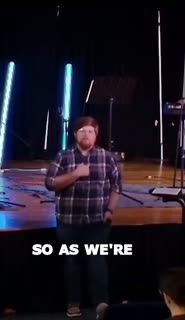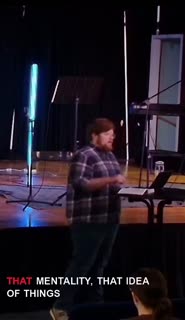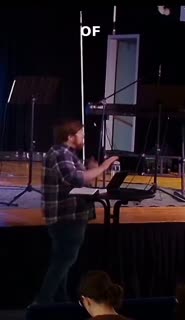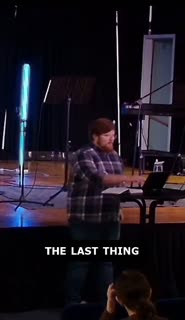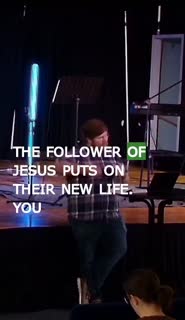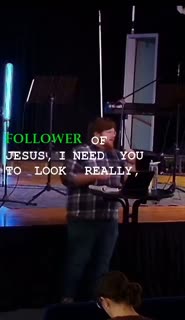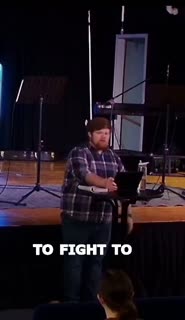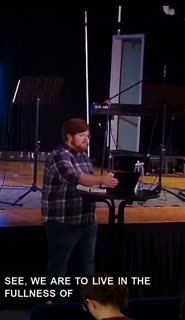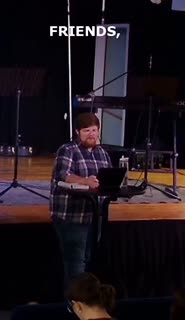Transforming Theology into Daily Living in Christ
Devotional
Sermon Summary
Bible Study Guide
Sermon Clips
1) "So as we're thinking about how we believe about God, or what we believe about God, or what's true about God, that determines how we act. Like, that's the point. So when we talk about big theological concepts, we talk about who God is, who Jesus is, what the gospel is. The point is, that determines how we act. It determines how we live. And so that's where Paul's going to dive into today." [34:02] (24 seconds)
2) "That mentality, that idea of things being dead that don't know they're dead yet, that's how Paul talks about our sinful self. that's the idea that he gives us we've read it already that they're dead and they don't know it yet in colossians 2 20 he says if you with christ died to the elemental spirits of this world why is if you were still alive you submit to their regulations i love that question because and we talked about it a few weeks ago pastor mark did i love that question because it haunts me if you are alive in christ and these things are dead why are you still submitting to them why are you still hanging out with dead things" [40:22] (41 seconds)
3) "The follower of Jesus puts to death their old life and their new life and their new life and their new life and their old lives the follower of Jesus puts to death their old lives it's a it's a really important thing that we need to understand and i will say this is something that i have i've been um meditating on kind of wrestling with as we've been walking through the book of colossians especially in community group and as i've been studying and reading the the way that we today talk about sin is wrong because we like to talk about sin like it's this living monster that creeps up on us that captures us and sneaks us away from the lord we like to think about sin like it is this thing that is alive and it is it's constantly seeking to destroy us that is not how paul talks about it he says it's dead it just doesn't know it yet" [45:21] (59 seconds)
4) "The last thing that I'll say about this is that the things that Paul lists here are not just cherry -picked. Um, they are actual abuses of good gifts that God gives us. And they speak specifically to an idolatrous heart that glorifies the gift or self over the world. Over God himself. That's what Paul is saying. Put it to death. That idolatrous heart that leads to this." [49:15] (25 seconds)
5) "The follower of Jesus puts on their new life. You get a new life when you follow Jesus. And you get to put it on. We're going to pick back up in verse 10. It says, and having put on the new self, which is being renewed in knowledge after the image of its creator. I love this language. And I'm going to confess, this is one of my favorite chapters. in all of scripture, so I'm sorry if I just go off, but I love this because it's a beautiful picture. Paul is telling us that we put on this new self because it is the actual image of God." [01:07:37] (41 seconds)
6) "Follower of Jesus, I need you to look really, really closely at verse 12. Because I need you to really see this. Because this is your identity in Christ laid bare in his word. You are God's chosen one. That means that you were chosen by God as his own. You are not left over. You are not what was left. You are not the one who he just said, oh yeah, I'll take them to you, I guess. You were handpicked and invited to be his. If you are a follower of Jesus, I need you to know this. Out of all the peoples of the earth, God chose you." [01:12:24] (37 seconds)
7) "You don't have to fight to protect your little castle in the sand that you get to build on this planet. No, what you get to do is you get to trust. You get to live as full image bearers of God. You are free in Christ, not to sin or to hold others to judgment, but you are free to be compassionate, kind, humble, meek, patient, forbearing and forgiving and loving no matter what you receive. See, the word for me is love. The world doesn't view it that way. The world views those things as transactions. I give you kindness because you were kind to me. I give you respect because you were respectful to me. I give you love because you loved me. As followers of Christ, you are free to give it. and expect nothing in return." [01:25:08] (39 seconds)
8) "See, we are to live in the fullness of Jesus. Anybody ever carried a bucket? Anybody carried a bucket? Anybody ever carried a bucket full of water? What happens when you try to walk with that bucket full of water? What's it do? It spills, right? Put another way, you get wet. Okay, right? It spills out. See, that's the image that it has here. We live in the fullness of Jesus so that Jesus spills out." [01:27:07] (28 seconds)
9) "Friends, thankfulness is a command. It's not a suggestion. It's an attitude of your heart. Those words, be thankful, speak to a continual striving for a deeper gratitude, a deeper understanding of thankfulness that is lived out and expressed as we experience the fullness of Jesus. This thankfulness is an understanding of the fullness of Jesus and how it is only in him that we are able to live this way, to put on the new self, to put to death the old." [01:33:21] (30 seconds)
Ask a question about this sermon
2) "That mentality, that idea of things being dead that don't know they're dead yet, that's how Paul talks about our sinful self. that's the idea that he gives us we've read it already that they're dead and they don't know it yet in colossians 2 20 he says if you with christ died to the elemental spirits of this world why is if you were still alive you submit to their regulations i love that question because and we talked about it a few weeks ago pastor mark did i love that question because it haunts me if you are alive in christ and these things are dead why are you still submitting to them why are you still hanging out with dead things" [40:22] (41 seconds)
3) "The follower of Jesus puts to death their old life and their new life and their new life and their new life and their old lives the follower of Jesus puts to death their old lives it's a it's a really important thing that we need to understand and i will say this is something that i have i've been um meditating on kind of wrestling with as we've been walking through the book of colossians especially in community group and as i've been studying and reading the the way that we today talk about sin is wrong because we like to talk about sin like it's this living monster that creeps up on us that captures us and sneaks us away from the lord we like to think about sin like it is this thing that is alive and it is it's constantly seeking to destroy us that is not how paul talks about it he says it's dead it just doesn't know it yet" [45:21] (59 seconds)
4) "The last thing that I'll say about this is that the things that Paul lists here are not just cherry -picked. Um, they are actual abuses of good gifts that God gives us. And they speak specifically to an idolatrous heart that glorifies the gift or self over the world. Over God himself. That's what Paul is saying. Put it to death. That idolatrous heart that leads to this." [49:15] (25 seconds)
5) "The follower of Jesus puts on their new life. You get a new life when you follow Jesus. And you get to put it on. We're going to pick back up in verse 10. It says, and having put on the new self, which is being renewed in knowledge after the image of its creator. I love this language. And I'm going to confess, this is one of my favorite chapters. in all of scripture, so I'm sorry if I just go off, but I love this because it's a beautiful picture. Paul is telling us that we put on this new self because it is the actual image of God." [01:07:37] (41 seconds)
6) "Follower of Jesus, I need you to look really, really closely at verse 12. Because I need you to really see this. Because this is your identity in Christ laid bare in his word. You are God's chosen one. That means that you were chosen by God as his own. You are not left over. You are not what was left. You are not the one who he just said, oh yeah, I'll take them to you, I guess. You were handpicked and invited to be his. If you are a follower of Jesus, I need you to know this. Out of all the peoples of the earth, God chose you." [01:12:24] (37 seconds)
7) "You don't have to fight to protect your little castle in the sand that you get to build on this planet. No, what you get to do is you get to trust. You get to live as full image bearers of God. You are free in Christ, not to sin or to hold others to judgment, but you are free to be compassionate, kind, humble, meek, patient, forbearing and forgiving and loving no matter what you receive. See, the word for me is love. The world doesn't view it that way. The world views those things as transactions. I give you kindness because you were kind to me. I give you respect because you were respectful to me. I give you love because you loved me. As followers of Christ, you are free to give it. and expect nothing in return." [01:25:08] (39 seconds)
8) "See, we are to live in the fullness of Jesus. Anybody ever carried a bucket? Anybody carried a bucket? Anybody ever carried a bucket full of water? What happens when you try to walk with that bucket full of water? What's it do? It spills, right? Put another way, you get wet. Okay, right? It spills out. See, that's the image that it has here. We live in the fullness of Jesus so that Jesus spills out." [01:27:07] (28 seconds)
9) "Friends, thankfulness is a command. It's not a suggestion. It's an attitude of your heart. Those words, be thankful, speak to a continual striving for a deeper gratitude, a deeper understanding of thankfulness that is lived out and expressed as we experience the fullness of Jesus. This thankfulness is an understanding of the fullness of Jesus and how it is only in him that we are able to live this way, to put on the new self, to put to death the old." [01:33:21] (30 seconds)
